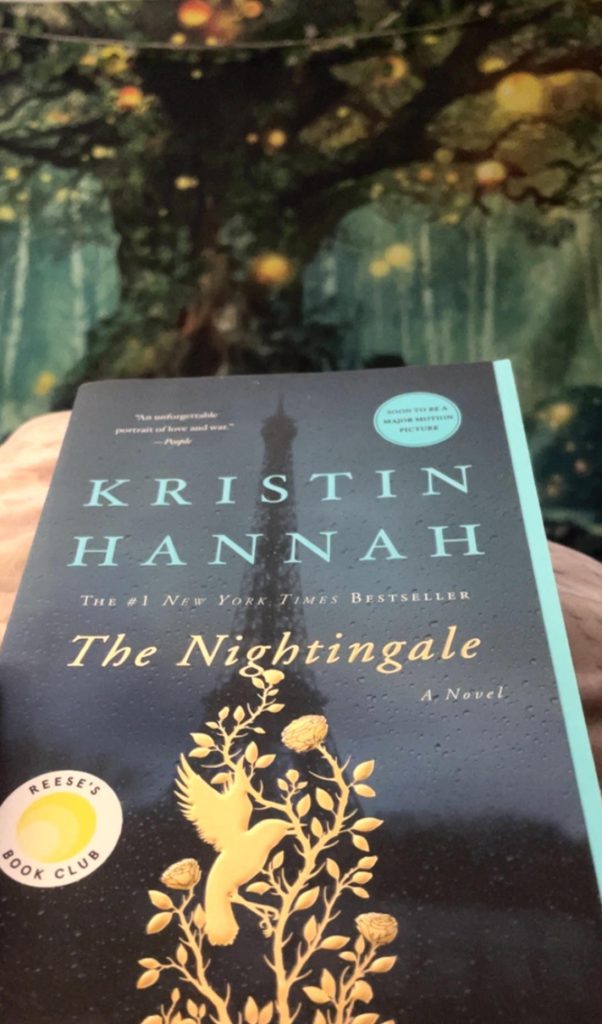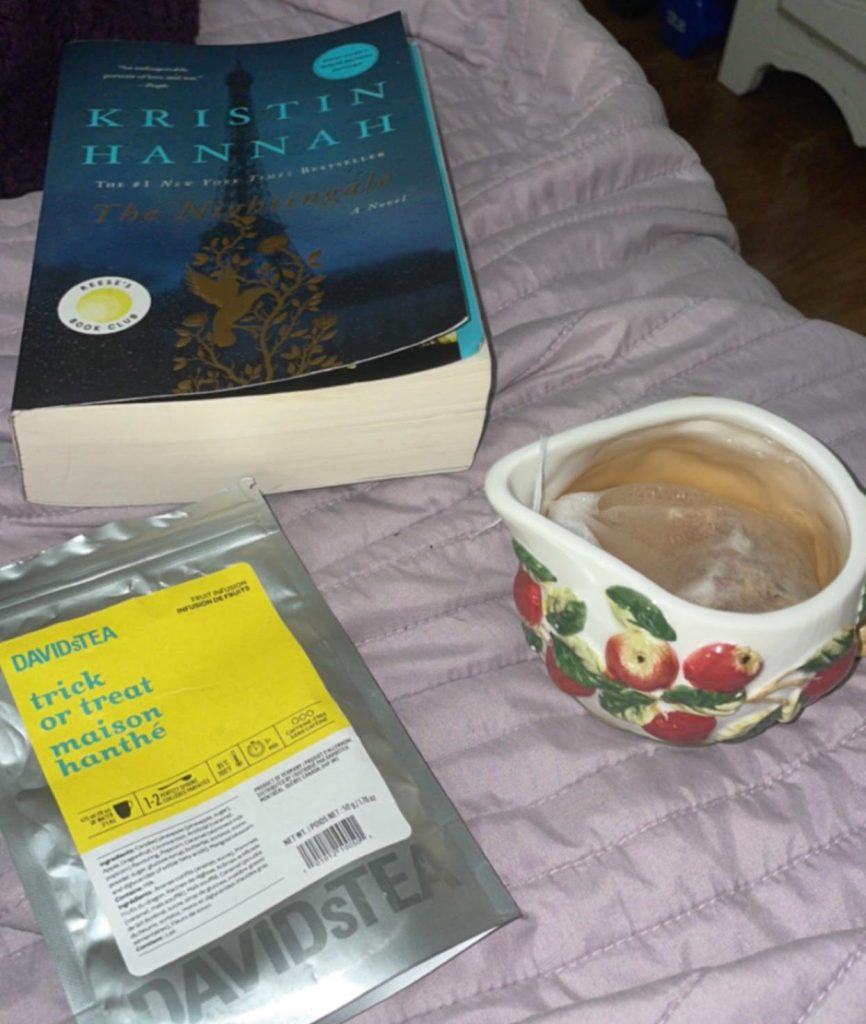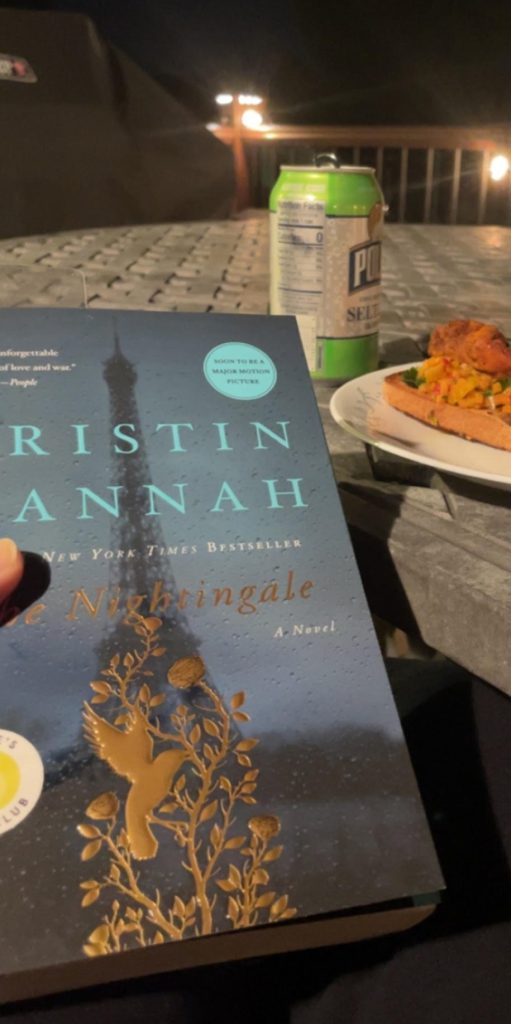The Nightingale by Kristin Hannah, 2015
You ever finish reading a book, hug it to your chest like it’s a long past lover, time for goodbye, but you’re just not ready for it yet?
That is the exact action I took as soon as I closed the back cover of The Nightingale.
In Kristin Hannah’s beautifully poignant historical fiction, The Nightingale, we follow two sisters living in France – Vianne and Isabelle – from the start of World War ll to the end. Don’t get me wrong, this is unmistakably a story about the war, but in Hannah’s brilliant and graceful way, it is also a story about two very different sisters who learn to love each other amidst a background of prejudice, violence, and death.
Vianne and Isabelle are polar opposites—Vianne, a happily married elementary school teacher and mother to 8-year-old Sophie, lives peacefully in her grand childhood home, Le Jardin, versus Isabelle, the reckless younger sister who rejects authority, has been expelled from countless girls’ schools, and yearns for a relationship with both her sister and their father, who has wanted nothing to do with either daughter since the death of their mother during the girls’ childhood.
The bulk of the novel’s action is based around the German occupation in France. Each of the sisters represent, with care, a way of responding to the fear, chaos, and tragedy which ensues with war. Vianne, mother (now single, as her husband is sent to fight) responds with submission and civility while Isabelle, fighter (alone, as she has no ties in the world, not to her father and not to her sister), responds with anger and resistance.
The characterizations of both Vianne and Isabelle are done so prudently that despite their being foils of each other, I didn’t have a preference for one sister over the other. It’s needless to say that the novel’s dire, calamitous foreground leaves readers unable to truly fathom which response would be their own. Of course it would be nice if we could all be courageous and heroic like Isabelle, a character who joins the French resistance, sets up an underground system to rescue downed airmen, and treks with them through mountains to safety in Spain; but we also sympathize with Vianne’s selflessness as a mother, where her priority before all else must be to provide security for her daughter, and that maternal instinct is challenged in the extreme after Nazi soldier, Captain Beck, is billeted in Vianne and Sophie’s home.
This situation, which the novel’s plot largely consists of, generates much of the novel’s intensity, for readers must grapple with their feelings about Captain Beck, who is objectively a bad man, but is not characterized with a villainous nature. Beck’s arrival is also the acting force which creates the rising tension between Vianne and her sister, as Vianne must continually make the inconceivable choice between keeping her daughter safe (away from the dangers which Isabelle’s resistance brings) and providing Isabelle a home.
The way this novel depicts love is one of the most canny and honest ways I’ve read thus far. The love between Isabelle and Vianne is strong and bound to sisterhood, yet is complicated and, against the backdrop of war, is not all that matters.
Then we have the love between Vianne and her husband, which is a textbook teenage love story turned happily ever after with the beautiful daughter on the beautiful lakeside estate—until the war, of course, which brings the sad reality that they have endured such unspeakable trauma as individuals apart, and have inevitably distanced through it. Of course, as love goes, this is not irrevocable, and with effort, they can find their way back to who they were together before being separated by war.
And, a favorite for the hopeless romantics (me, me, me), is the love between Isabelle and Gaëtan; so pure and selfless and characterized by such fervent yearning.
There’s also the love between Vianne and her best friend and neighbor Rachel, and the love Vianne has for her daughter as well as her later adopted son.
And, maybe most complicated, is the love between Vianne and Isabelle and their father, Julien, which is both selfish and selfless, and which maybe is most to blame for my tears during the novel’s climax.
This story is so artfully layered – love and hate and love and hate – and it stays authentic to the violent and immoral tragedy which war brings. Though brutal and, at points, hopeless, Hannah’s poignant writing left me feeling incredibly thankful and with such a strong, unmatched desire to love those around me just that much harder.
5/5.
Trigger Warnings: War, civilian death, child death, antisemitism, separation of families, SA
Quotes:
I always thought it was what I wanted: to be loved and admired. Now I think perhaps I’d like to be known.
At his kiss, something opened up inside the scraped, empty interior of her heart, unfurled. For the first time, her romantic novels made sense; she realized that the landscape of a woman’s soul could change as quickly as a world at war.
“Tante Isabelle says it’s better to be bold than meek. She says if you jump off a cliff at least you’ll fly before you fall.”
Sure enough, her dolls were still there, some slumped and others standing tall.
Isabelle couldn’t look away. She was angry at him – she knew that, felt it – but as he came toward her, the anger dried up and blew away like dust beneath the longing that mattered so much more. Their gazes met, held, and then he was past her, reaching for the doorknob, going outside. The door clicked shut behind him.
“I hope you never know how fragile you are, Isabelle.”
Or maybe she was wrong, and he wasn’t here, had never been here, watching her, waiting for her. Maybe she was just a silly girl longing for a man who didn’t want her, standing alone in an empty street.
She wanted to pray, but her faith felt far away, the remnant of another woman’s life.
Forgive me, my daughters, for all of it, and know that as I say goodbye, I loved you both with all of my damaged heart.








